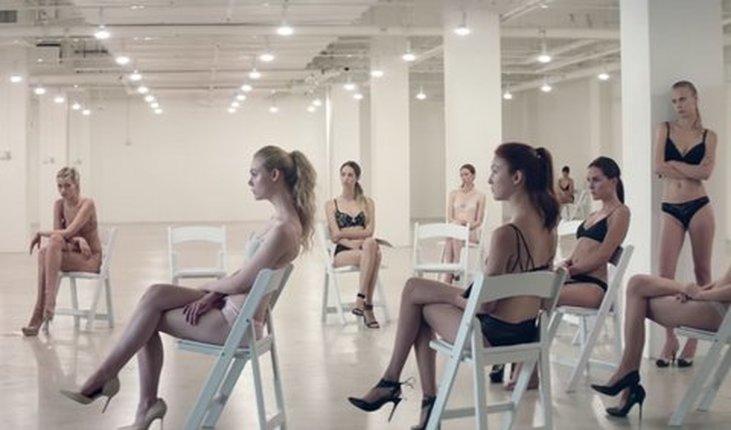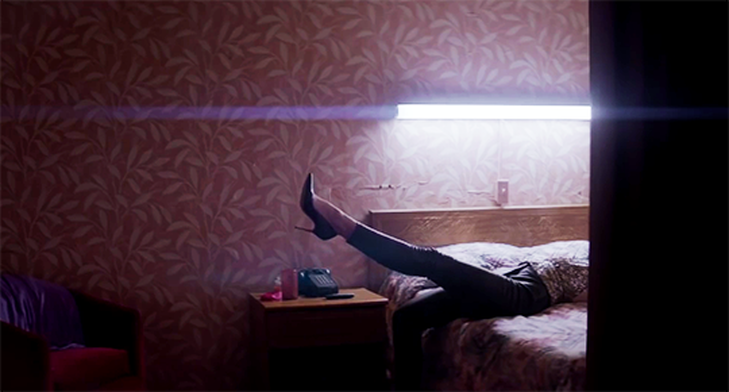 Nicolas Winding Refn's The Neon Demon is another subversive, stylistic nightmare by the Danish filmmaker, a film that uses the fashion industry as a way to look at the darker aspects of physical beauty, focusing on societies obsession with a trait that isn't earned, rather given through genetics. The film is centered around Jesse, an aspiring model, who has just moved to Los Angeles, attempting to break into an industry she has little experience in. Only 16-years-old, Jesse quickly befriends, and I use the term loosely, a make-up artist and two other models, whose catty demeanor is apparent right from the beginning. The two models in particular view Jesse as competition, someone who could take business away from them, but in an industry where youth and vitality are the most coveted attributes, Jesse begins to see her career excel, much to the chagrin of her "friends". Without going into too much detail, The Neon Demon is a film that is sure to confound some viewers with its heavy symbolism and abundance of style, but what Nicholas Refn has created is a film that captures the cannibalistic nature of competition, creating an expressionistic portrait of the downfalls of placing value on physical beauty, one where the collective ideals reinforce nastiness, fuel competition, and define a females' individualism by their physical appearance. In this film, Jesse is the quintessential symbol of beauty and vitality, a character whose near instant success places a bullet on the back of her head from the beginning. Jesse is a humble character, one who believes her only sense of value comes from her physical appearance, she has come to expect this, for better or worse, and seeks to empower herself through societies' values. Going from audition to audition, Jesse begins to catch the eye of the fashion industry, quickly supplanting her "friends" in some of the fashion shows and photoshoots. Jesse's humble demeanor begins to slowly shift towards narcissism, as she falls victim to the same type of collective idea of worth and value placed on physical beauty. One particular sequence, on a runway, visually expresses this change in demeanor of Jesse, where Refn uses mirrors to fill the frame with reflections of Jesse's beauty, the reflections kissing themselves as the color palette turns from blue to red, a visual representation of Jesse's assimilation into this collective ideal of female worth. Jesse is a character who conformed to what society wanted by accepting the ideal that her physical beauty defines her worth, and yet in the end she is destroyed by it, quite literally. Without going into details, the same collective that values physical beauty above all else destroys her because she reached the top, as Neon Demon presents a commentary not only on objectification but the inherent selfish, cannibalistic nature of society to want to be the best. While brooding and expressionistic, it is important to remember that The Neon Demon intentionally maintains a hyper-exaggerated sense of reality, one that effectively skewers the vapid culture of Los Angeles, exposing the nastiness which exists just under the veil of politeness. The film can be too "on the nose" at times, laughing at the absurdity of the situation its characters find themselves in, but I'd argue its playful absurdity is part of its charm, with Refn balancing the horror elements with absurdist comedy in a way that perfectly captures the craziness of this beauty culture. I'll take it a step further, I'd even argue that The Neon Demon's greatest attribute is how it exposes the true demon in cultural collectivism, and how that in itself eviscerates identity/gender politics. By the end of this film, both women and men have succumbed to this collective perspective of beauty, both feeding into the societies' ideal, becoming competitive to either get a piece of it (men) or become it (women). Hyper-exaggerated, stylish, and atmospheric, Nicholas Winding Refn's The Neon Demon is another fascinating nightmare which juxtaposes beauty with violence to startling and thought-provoking effect.
0 Comments
Leave a Reply. |
AuthorLove of all things cinema brought me here. Archives
June 2023
|



 RSS Feed
RSS Feed
